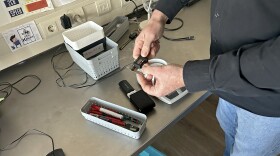Anyone looking for a COVID shot for themselves or their kids in Louisiana is facing a new maze of pharmacy restrictions after changing federal guidance on the vaccine.
Large chain pharmacies, including Walmart, CVS, and Walgreens, started requiring prescriptions for the vaccine this month for anyone under the age of 65 in Louisiana and 15 other states, including Alabama and Mississippi.
And each chain has its own rules for children — if they’re offering them at all. It’s a significant change from last year, when anyone could walk into a pharmacy and get a COVID shot on demand, one that’s causing confusion and delays in getting vaccinated.
“It’s as clear as mud,” said Dr. Matthew Morvant, owner of Downtown Drugs, a family-owned independent pharmacy in Covington, Louisiana. “No one knows the correct information.”
In Louisiana, Walmart said its pharmacies aren’t administering COVID vaccines to anyone under 17 — even with a prescription.
In a statement to the Gulf States Newsroom, Walmart said it is following “guidance outlined by the state,” but did not point to the specific guidance. The Louisiana Department of Health website says children as young as six months are eligible. LDH has not responded to a request for comment. At one New Orleans Walmart location, a pharmacist advised patients to travel to Mississippi to get the shot.
Children five and older can receive a COVID vaccine with a prescription at CVS, according to a statement from Kara Page, the manager for corporate communications. She said that was based on state pharmacy law, which states that pharmacists can administer vaccines without a prescription when they are recommended by the Centers for Disease Control and Prevention.
A Walgreens pharmacist confirmed children five and older can get a COVID immunization with a prescription, but Walgreens corporate office did not respond to a request for comment. The Louisiana Board of Pharmacy did not respond to multiple requests for clarification.
Children under five typically receive vaccinations from a physician’s office. But it’s unclear how many people have been unable to get themselves or their children vaccinated amid the confusion.
Jennifer Herricks, founder of Louisiana Families for Vaccines and advocacy director of American Families for Vaccines, said she’s heard of people having trouble getting the vaccine, describing it as a patchwork of policies for families across the state.
Dr. Jennifer Avegno, who heads the New Orleans Health Department, said she’s getting calls and texts from people saying they had a prescription, went to their local pharmacy — usually one of the big chain pharmacies — and were told they can’t receive the vaccine because of restrictions.
“I’m hearing nothing but confusion, and it’s not just for kids,” Avegno said. “Each store manager is interpreting it differently and maybe each pharmacist is interpreting it differently. In the absence of standard guidance, that’s what happens.”
That can leave vulnerable patients unprotected.
An ‘enormous confusion’
Part of the confusion stems from overlapping layers of authority and shifting recommendations.
Last month, under Health and Human Services Secretary Robert F. Kennedy Jr., the Food and Drug Administration changed its COVID vaccine recommendation, approving it for anyone 65 and older, or those with underlying conditions with a prescription.
Then last week, Kennedy’s remade vaccine panel, the Advisory Committee on Immunization Practices, kept existing recommendations for COVID shots for anyone 6 months and older, but with an emphasis on “individual decision-making.” That should mean insurance can cover immunizations for anyone six months and older, according to HHS.
“They have created this enormous confusion. [It’s a] failure at the national level to harmonize that recommendation in a way so that everybody knows what's happening,” said Dr. Georges Benjamin, executive director of the American Public Health Association.
COVID vaccines are safe and effective, Benjamin said, and getting one should be no more difficult than getting a flu shot. But conflicting messaging has left providers, insurers and patients uncertain — and pharmacies making their own rules.
“A lot of the pharmacies are simply saying, let’s take the safe route. Let’s authorize it for the people that we know we can do it for, that we can get paid for,” Benjamin said. “Everybody’s basically covering their — you pick the word — in doing this.”
Dr. Michelle Fiscus, a pediatrician and chief medical officer with the Association of Immunization Managers, a national public health non-profit, said limiting access has real consequences. When faced with barriers and confusion, people may simply give up.
“If someone who wants to be protected against COVID-19 goes to one pharmacy and is told that they can't get that vaccine, or goes to their medical provider and is [told] that they cannot get that vaccination there, there's only just so many times they're going to try,” Fiscus said. “Ultimately, it’s the patient who ends up suffering from a disease that they actually wanted to prevent with a vaccine.”
‘The plan is to deter’
Morvant, the Covington pharmacist, said he typically administers flu or COVID vaccines for 40 to 60 people a day during peak illness seasons.
For COVID vaccination, the process used to be simple. Patients would walk in, provide insurance and basic medical history and receive the vaccine within minutes.
Now, requiring a prescription adds hurdles even for adults. Morvant has proactively contacted local doctors to issue blanket prescriptions. If a patient arrives without one, he’ll call their provider directly. Larger chains, he said, aren’t likely to take those extra steps.
He believes the prescription requirement is a deliberate barrier.
“The plan is to deter,” he said. “Some people think the COVID vaccine is dangerous. And if they think that, I would say, then just don’t get it. If 1% doesn’t want it, that’s fine, then don’t take it. But don’t block the other 99% from getting it. That’s just stupid.”
Louisiana’s political climate adds another layer. State Surgeon General Ralph Abraham has been outspoken in his criticism of COVID vaccines, especially for children. In an official LDH statement earlier this year, Abraham called CDC guidance for vaccinating children “woefully out of touch with reality.”
In a September op-ed for The Center Square, Abraham went further, writing that “virtually every parent in the U.S. understands that COVID-19 shots for healthy children are a very bad idea,” and praised federal limits under Kennedy’s HHS.
That skepticism at the top of Louisiana’s health department stands in sharp contrast with the overwhelming consensus of medical research and national recommendations. Last Friday, the CDC’s Advisory Committee on Immunization Practices reaffirmed that COVID vaccines should remain available to anyone six months and older.
For Morvant, who knows his patients personally, the stakes are even more stark.
“I’m gonna tell you what happens when people don’t get vaccinated for it,” he said. “People will die. And if they don’t, they’re going to end up in the ICU and they’re not going to be the same person when they come out.”
This story was produced by the Gulf States Newsroom, a collaboration between Mississippi Public Broadcasting, WBHM in Alabama, WWNO and WRKF in Louisiana and NPR. Support for public health coverage comes from The Commonwealth Fund.











